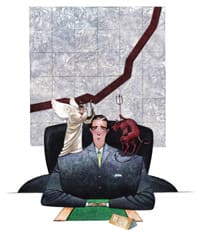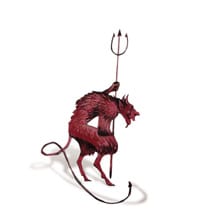Buy
or Lease?
There is no good or bad answer when it comes to equipment--it's about what works best for you
by Susan P. Tarrant
Deciding to invest in an in-office edging or finishing lab was important. Undoubtedly, you did your research and came to the conclusion that it was right for your business. Or you decided it was time to upgrade your equipment to take advantage of the myriad of technical advances evident in today's equipment.
But you're not done yet. You've got to decide how to pay for it all. There are some choices you need to deal with in the financial arena--namely, whether you will be leasing the equipment or buying it outright.

Determining which payment option for your in-office equipment--leasing or buying outright-- is right for your business is like choosing which pieces of equipment are right for you: It depends on your business needs and financial preferences. Dispensers need to look at their business plans and financial set-ups to determine which way to go. We asked equipment and financial professionals to address some of the reasons customers choose between leasing over buying and what the benefits are for each option.
Steve Swalgen, director of sales for Santinelli International, says his company's customers are split about 50-50 between leasing and buying. "It has been trending a little more toward leasing recently. People like to take advantage of the tax incentives of leasing. But they also like the advantage of limiting their capital outlay."
Among Briot-Weco's customers, about 70 percent opt to lease their equipment, according to Bret Davis, national retail sales manager. However, just because more of his customers opt for leasing doesn't mean that purchasing the equipment is necessarily wrong, he stresses. It just depends on what financial arrangement is best for the individual dispenser, as there are tax incentives for either option.
TO BUY
There are actually three ways to purchase equipment. You can pay cash, get a traditional loan from a bank, or get an installment lease plan.
One of the most cited reasons dispensers opt to purchase their in-office lab equipment is Section 179 of the U.S. Tax Code. Section 179 allows for a one-time capital purchase deduction, the exact amount of which changes from year to year--for 2002, it's $24,000.
An additional tax incentive has now been thrown into the ring, adds Tom Fefer, western regional sales manager for Santinelli International. An amendment to Section 179 allows 30 percent of the remaining balance to also be written off. That amendment stays on the books through 2004, he says.
Purchasing equipment in one lump sum may be the only choice for a dispenser with a bad credit history or one who already has substantial lease or loan payments.
Another reason, according to Debra P. Schmidt, vice president of sales for Popular Leasing, the AOA-approved provider for equipment leasing programs, is that the willingness to use cash gives the buyer a certain amount of leverage and power when it comes to pricing. "If you've got the money, you've got the power to negotiate a lower price," she says, adding that a cash purchase also avoids interest payments.
TO LEASE
The most successful optical practices Briot-Weco's Davis knows always lease. "These are practices that can afford to write a big check, but they lease," he says.
Why? "It doesn't cost you anything, plus you get a tax benefit," he says, explaining that most retail lab equipment, like edgers, pay for the themselves through a savings on outside lab costs.
Dispensers can get a traditional "installment" lease, which is similar to a loan in that you own the equipment when you're finished. These contracts may be desirable over traditional bank loans because they may offer a fixed interest rate with a low or zero down payment. A bank will traditionally want a down payment of 15 to 20 percent, and may not offer secured rates, although the rates may be lower than a lease. A Section 179 one-time capital tax deduction is also applicable to this type of lease.
Much more popular, however, is a technology upgrade lease, which allows the dispenser a bit of flexibility to upgrade to the latest technology even before the terms of the lease are up. "Technology changes. You want your contract to be flexible so you can meet those changes," Schmidt says.

Tax deductions also support the leasing camp. Technology upgrade contracts and lease-to-buy programs which require a balloon payment at the end offer something that can be even more popular than the one-time capital equipment deduction--long-term tax deductions. Every lease payment, including sales tax, can be completely written off through the life of the contract.
Should you opt to lease, go only with accredited institutions that use their own money and don't act as a third-party lender. If there's a bank behind the leasing company, they have to adhere to strict banking regulations--an important factor since the leasing industry is still unregulated.
Purchasing and leasing plans each have their advantages, and only you and your accountant can decide which is the most beneficial way for you to proceed.
|
|
ADVANTAGES OF LEASING
ADVANTAGES OF BUYING
HOW TO CHOOSE A LEASING COMPANY "There are good leasing companies and there are bad leasing companies," says Bret Davis, national retail sales manager for Briot-Weco. So if a dispenser chooses to lease his new equipment, how can he be sure he's working with a reputable company? Here are some tips:
|



